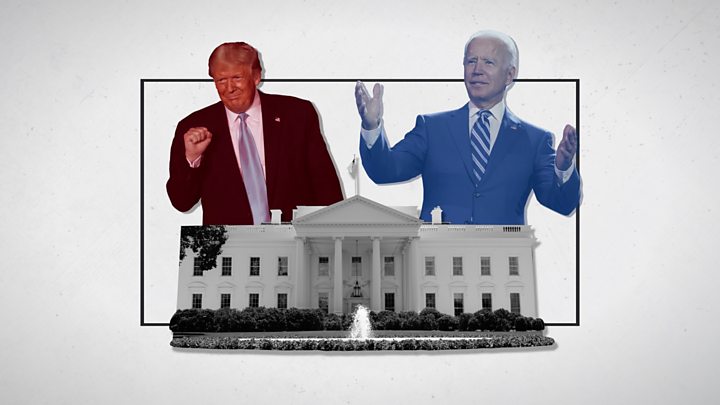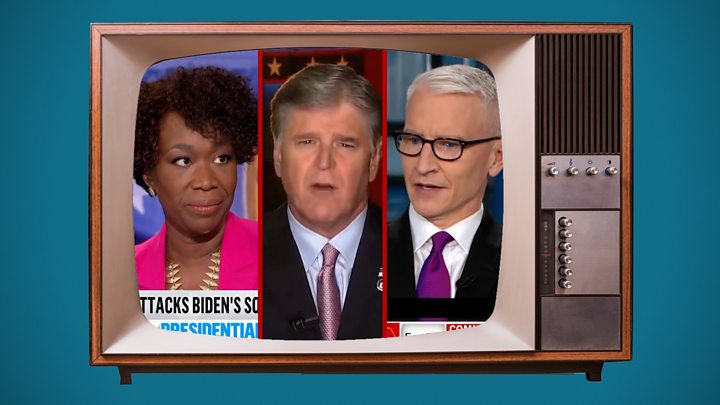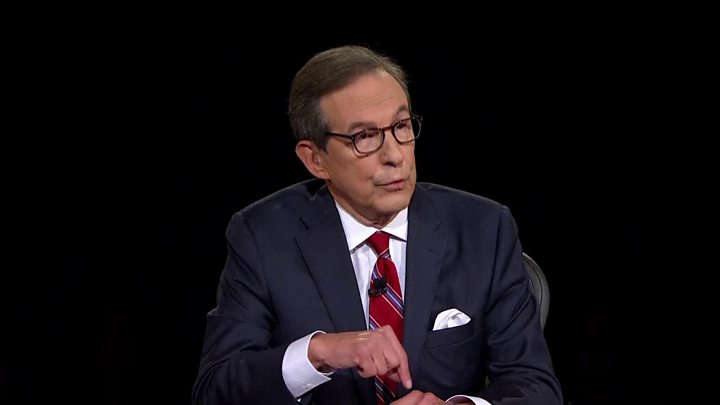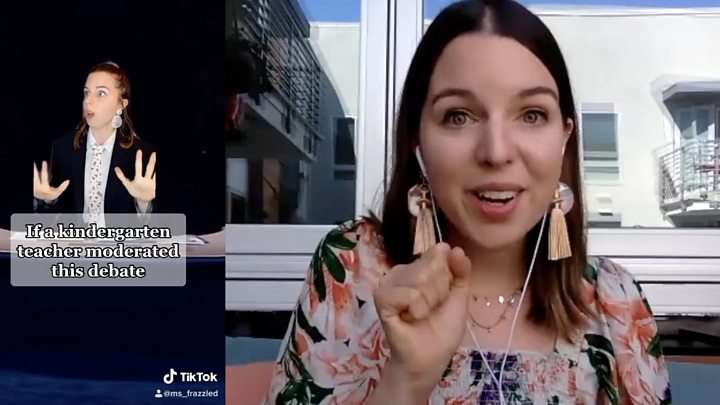
How to avoid another Trump-Biden ‘car-crash’ debate

Media playback is unsupported on your device
Among those who tuned in for the first US presidential debate, there is a clear and growing consensus that the first on-air face-off between Donald Trump and Joe Biden was a mess.
For some 90 minutes, the candidates shouted, bickered and largely ignored the topics at hand, despite repeated pleas from moderator Chris Wallace.
And it looks like the Commission on Presidential Debates – the nonpartisan charity that sponsors the events – agrees. On Wednesday, the group said the first debate had “made clear” that additional structure must be added for the remaining two match-ups. One possible change being considered is cutting candidates’ microphones if they try to interrupt each other, according to CBS News.
President Trump has since responded, in a tweet, implying that he would not be willing to accept changes to the format.
With two weeks until Mr Trump and Mr Biden are back in the ring, what could these next debates look like?
Mute the candidates?
Typically, presidential debates give voters a chance to hear what the candidates have to say before casting their ballots. During’s Tuesday event, however, there was a prevailing wish among those watching for the two men on stage to be quiet.

Media playback is unsupported on your device
As the debate wore on, social media was flooded with requests – from voters, pundits and journalists – for moderators to be given the power to selectively mute the candidates and prevent them from jumping in out of turn. Though both nominees were guilty of interruptions, President Trump was by most accounts the more egregious offender, cutting in some 73 times, according to CBS news.
This change is now said to be at the top of the list of those proposed by the debate commission, according to US media.
The calls for muting seem to be a product of the Zoom-era brought about by the coronavirus pandemic. When working from home and using video-chat apps, such as Zoom, we’re now able to mute ourselves and turn the volume down on colleagues – a tool that could conceivably lend a hand to a moderator desperate to maintain calm.
A better moderator?
Many who were unhappy with Tuesday’s performances expressed dissatisfaction with moderator Chris Wallace.
From the outset, the Fox News anchor struggled to maintain control of the candidates, resorting to desperate appeals to Mr Trump to stop talking and allow his opponent to finish, at one point shouting for the president to “Let him [Mr Biden] answer!”

Media playback is unsupported on your device
But many defended him, saying that dealing with this set of candidates – namely Mr Trump – was a tough order for anyone.
“I don’t blame Chris Wallace at all. He’s a stellar, stand-up journalist,” presidential historian Laura Ellyn Smith told the BBC. “He did well with the Clinton-Trump debate in 2016, he was a good choice to moderate. He was given an almost impossible task, straight out of the gate.”
Speaking to the New York Times the morning after, Mr Wallace said he was saddened by the way the evening had unfolded.
“I never dreamt that it would go off the tracks the way it did,” he said.
Image copyright
Getty Images
The Trump-Biden face-off was marred by bickering and frequent interruptions
For the next two debates, Mr Wallace will pass the torch. First, to Steve Scully, a political editor with the C-SPAN television network and then to Kristen Welker, White House Correspondent for NBC News.
Will they have a better chance of keeping the candidates in check? That is a great unknown. As a conservative veteran from Mr Trump’s favourite network, praised for his work as moderator in the last presidential election, Mr Wallace was thought to have as good a chance as any. But even he proved no match for the chaotic collision this year.
A new format?
This change is already certain. The next debate, on 15 October in Miami, Florida, will be in a town-hall format, where candidates take questions from voters instead of journalists. Here, the environment is generally more casual. In pre-coronavirus elections past, candidates have been seated within arms’ reach of voters, instead of protected behind a podium on stage.

Media playback is unsupported on your device
The town-hall style may serve to benefit these particular candidates, Ms Smith said, adding that it might bring some civility. “In the first debate, they were just looking at Chris Wallace, the room otherwise is pretty dark,” she says.
This time, neither Mr Biden nor Mr Trump will get to steamroll the moderator – they’ll have to answer directly to voters.
“It might inspire a bit more confidence and might bring a bit more pride back into the format of debate,” Ms Smith said.
Call them off?
Some voters and pundits alike who tuned into the first debate think the events aren’t worth saving. As Tuesday’s contest was unfolding, Twitter was alighting with pleas to cancel the remaining match-ups entirely.
“I wouldn’t be surprised if this is the last presidential debate between the president of the United States and the former vice-president of the United States,” CNN anchor Wolf Blitzer said minutes after the face-off concluded.
“For the sake of democracy, cancel the Trump-Biden debates”, read the headline of a New York Times column by Frank Bruni. The call was echoed by the Washington Post, Slate and the Atlantic magazine.
Image copyright
Getty Images
The debate convention is now considering muting candidates’ microphones for the next contest
But the debates still have their defenders, including Ms Smith.
“I think that would be a step in the wrong direction [to cancel]. It would be admitting defeat at this point,” she said. “The debate has been a helpful way in the past to demonstrate candidates’ skills. To see policy, even, in a bit more detail.”
She added: “I don’t think you should ever cut back on dialogue in democracy, even if it’s loud.”
The remaining debates will proceed as scheduled on 15 October and 22 October, with new rules from the debate commission to be announced this week.
But the running mates – Vice-President Mike Pence and California Senator Kamala Harris – will be squaring off first in their debate on 7 October. It is expected to be less raucous than the one between the two men at the top of the ticket.

















